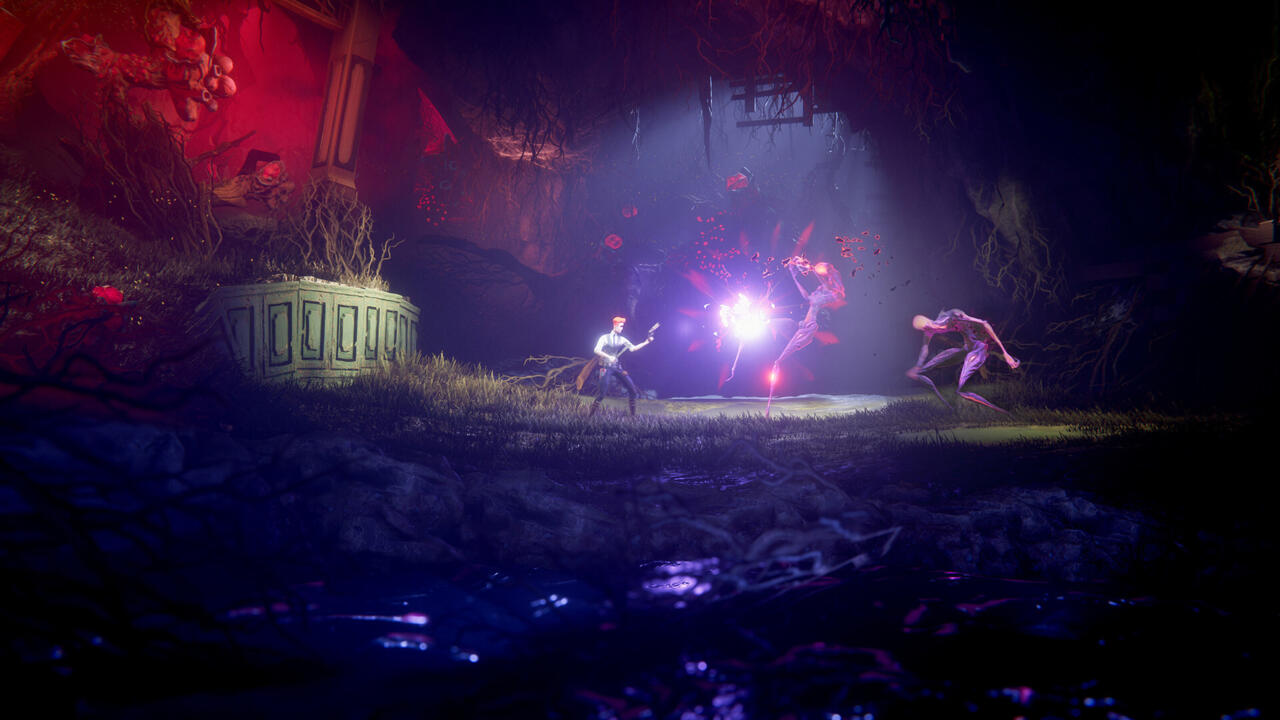Like my favorite Metroidvania game, The Last Case of Benedict Fox It is built around solving mysteries. It may be trying too hard to be deep and mysterious, especially in the first half, but engaging puzzles and anxiety-inducing art, even when mediocre combat and platforming mechanics get in the way of the fun Direction will pull you. The Last Case of Benedict Fox has an intriguing story, wrapped in an intriguing world of supernatural conspiracies, and I’m curious to know more. It takes some time to fully reveal the best parts of it.
In Benedict Fox Last Case, you play as a great detective who breaks into a strange mansion to investigate a ritual he wants to perform. Unfortunately, the answers he seeks now lie in the minds of the late young couple. Thankfully, Benedict gives you supernatural powers, including the ability to connect with eerie demons and enter the minds of people who have just died. Entering what Benedict called “limb” takes you into the vast mind palace space. Each of its palaces is filled with the worst nightmares, anxieties and traumas of the deceased transformed into physical monstrosities. As you explore further, you’ll find the memories you need to unlock new parts of the real-world mansion and piece together the steps to the ritual.
Even if all this sounds a bit complicated and leaves a lot of questions, that seems to be what The Last Case of Benedict Fox is going for, and what it takes to fully understand what’s going on. It just seems to throw you into a layered situation without preparation. . Unfortunately, the game puts the cards too close to the chest, and what exactly the ritual Benedict is studying does, and why he’s looking for it, is hidden throughout the first half of the game. It has been. The plot moves well beyond intriguing and mysterious into confusing territory for the first half of its run time. This makes for a very unwelcome opening, where names, dates, lore, and jargon are thrown right in with little explanation, setting up stories and character motivations that are hard to parse. Once you manage to get into the game, The Last Case of Benedict Fox begins to politely answer some of the questions that are posed, giving you even more reasons to want to explore its enchanting Lovecraftian world. It still takes time. too long to get there.
This is unfortunate. After all, The Last Case of Benedict Fox is built on a fascinating world and a deep lore that desperately needs to be revealed, a traditional exploration of the genre. It’s a winning formula for any Metroidvania game, given its importance. If you’re willing to go out and map the mental corridors of dying people, there are so many cool, supernatural threads out there that it’s somehow unsettling for the weight of the story. Styled in a world that feels colorful. Each part of Limbo is more frighteningly beautiful than the last. I especially enjoy how the minds of the people you dive into affect the unique layout and environmental puzzles of each level. At one point, you may find yourself running through a labyrinth of scientist logic. For example, a rhythmic clockwork in which his dying spirit changes space in a regular rhythm. Then, with only an emotionally scarred core of poison pools, brimstone lined walls, and frigid underbelly left, he jumps into the mind of a dead woman at the end of an emotional rope. increase.
Exploring these spaces is the key to solving the final case in many of Benedict Fox’s environmental puzzles, and this is the primary means of progressing through the game. Early on, I knew I had to find three pages of him detailing the ritual steps necessary to separate Benedict from his companions. Pages are scattered all over the mansion and require a bit of exploration. Because the man who designed Resident Evil 2’s Raccoon City police station is apparently also the architect of this mansion. The mansion is packed with different keys, each with a hidden secret. You can explore the mansion further and uncover story details.
The keys you need are in the memories of the people who once lived in the mansion. This means that you will regularly dive into the dying minds of the people who once lived in the mansion and uncover their secrets. Do you have a piece of paper with the note you need but it burns beyond recognition in the real world? Find the part of the brain that represents Do you need three strange, special keys to open a locked door? Better dive into the minds of nearby corpses to see if they have memories of keys you can bring back to the real world. prize.
The world of Limbo also has a wider variety of puzzles. I’ve found doors that require you to play a game of chess in a certain way to get through them, or combination locks that require you to take a picture with your phone to refer to the clues as you type in the answer. The Last Case of Benedict Fox is reasonable in terms of brain teasers, but it never reaches a level of difficulty that’s uncomfortable enough to make your brain spin frustrating.

In true Metroidvania fashion, there are also locks associated with abilities. These are her two forms. There are several obstacles in the world, such as number locks and miasma walls, which can only be surmounted by unlocking upgrades for Benedict’s equipment, and require finding specific items in Limbo. In addition, Limbo has keys such as fragile floors and demon-covered doorways that can only be climbed by demon companions, and must be tattooed with inky blood made from enemies. These parallel paths give you regular rewards, whether you’re discovering new areas to uncover equipment upgrades or defeating enemies to collect enough ink for new tattoos. That said, while exploring Limbo and uncovering secrets hidden in people’s minds is fun, the combat falls short.
Benedict Fox’s Last Case is routinely dragged down by clunky and unrewarding combat mechanics. Benedict is designed as a cautious fighter, and his repertoire in combat consists of simple counters, slow melee attacks, flintlock-like flare guns, and meanderingly slow recovery mechanics. These mechanics don’t match the pace of the enemies Benedict faces. Most of the enemies are very agile and attack hard and quickly, so being hit by multiple enemies is often overwhelmed quickly. There’s a regular frustration loop in which Benedict can’t react fast enough to enemy attacks and has to keep banging his head against the same challenge over and over again until he gets lucky and pulls through. that.
The Platforming Gauntlet is also a momentum stealer. At certain points in the game, Benedict will be trapped in pursuit, and if you don’t escape the pursuers you will die instantly and you will be sent back to where you started. It doesn’t matter if you died first or near the end. If you can’t execute all the jumps perfectly during these sequences, you’re set back to square one. Sometimes you end up playing tense platforming for close to a minute. These sequences aren’t all that frustrating in a real platformer, but Benedict’s Last Case stumbles in that the jump mechanics don’t quite fit the platforming challenges.
And that’s a shame. Because there is a problem here. I really like how the platforms work in-game. Benedict’s demon companion uses shadowy tentacles to grab hold of a nearby platform and pull Benedict forward with slow momentum. Visually spooky, but narratively coherent, it explains how a normal man can double-jump. But the floaty and imprecise nature of these jumps doesn’t match the speed and precision required for platforming chase sequences. As with the combat mechanics, there’s a frustrating disconnect between what the mechanics are and what the game demands of you.
To compensate for that shortcoming, Benedict Fox: The Final Case offers some excellent familiarity settings that let you customize the difficulty of combat, puzzles, and exploration. For example, you can make combat more difficult by requiring a significant number of hits before an enemy dies, or on the contrary make it less challenging and kill all enemies (even some bosses!) in one or two hits. can be defeated. There’s also an invincible mode, which when combined with the easier combat setting basically removes combat from the game entirely. Playing the game this way made the puzzles and explorations even more difficult, forcing me to dig around to find the clues I needed, but it actually made the game a lot more fun. .
These familiar systems in themselves are perfect for making Benedict Fox’s Last Case feel more welcoming to those struggling with any of the three main pillars of gameplay, but the combat can be a bit overwhelming. It also clearly emphasizes that it is getting in the way of this game. If we only had to consider the puzzle and exploration aspects of the game, the overall experience would be streamlined, and the attention to detail regarding story and art direction would be easier to appreciate.
Benedict Fox Last Case is one of my favorite Metroidvanias, and I’m the type to keep guessing exactly what’s going on. The first half of the game is overdone by the mystery setting, but the late narrative payoff partially makes up for it. This is the type of game that I recommend keeping your trusty notebook handy. The world design and puzzling story (albeit great) do nothing more to guide the player than hint at what’s to come. While the combat and platforming don’t quite match up with the game’s interesting storyline and great Lovecraftian-inspired art and his direction, the game includes ways to make the experience of playing the game more relatable.
https://www.gamespot.com/reviews/the-last-case-of-benedict-fox-review-fair-deal/1900-6418064/?ftag=CAD-01-10abi2f The Last Case of Benedict Fox Review – Fair Deal
